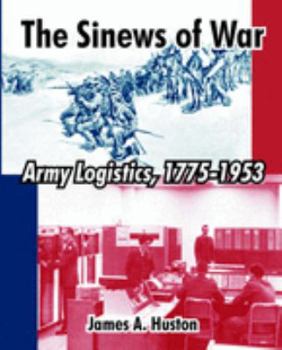The Sinews of War: Army Logistics 1775-1953
Select Format
Select Condition 
Book Overview
This work is a general historical survey of U.S. Army logistics. It contributes a better understanding of the significance of logistics in the American military experience, and provides an appreciation of some of the Army's logistical problems in its conduct of war from the Revolutionary War through the Korean War. Logistics covers a vast range of subjects. The word logistics came into general military use shortly before World War II, although its substance has been of concern as long as there have been armies. In Army usage it has come to include four principal elements in the support of military operations: (1) supply, including determination of requirements, procurement, and distribution; (2) transportation; (3) evacuation and hospitalization; and (4) service. In short, logistics is the application of time and space factors to war. It is the economics of warfare, and it comprises, in the broadest sense, the three big M's of warfare - materiel, movement, and maintenance. If international politics is the "art of the possible," and war is its instrument, logistics is the art of defining and extending the possible. It provides the substance that physically permits an army to "live and move and have its being."
Format:Paperback
Language:English
ISBN:1410213684
ISBN13:9781410213686
Release Date:June 2004
Publisher:University Press of the Pacific
Length:820 Pages
Weight:3.15 lbs.
Dimensions:1.8" x 7.6" x 9.2"
Related Subjects
HistoryCustomer Reviews
1 rating
A Classic and Important Book
Published by Thriftbooks.com User , 16 years ago
Sinews of War is a classic and important work on the history of US Army operations. It is probably the best book of its kind written on the largely overlooked yet essential and prerequisite factor of all military operations; logistics. Huston covers US Army logistics from the American Revolution to the Korean War including the organization, operations, mobilization, and its overall evolution from amateurism and almost entirely civilian contracted support of the Revolution to the professional logistics forces of the 20th Century, military and civilian. Huston also gives more than a simply retelling of past events, he also provides some analysis of the why and how events occurred and is not afraid to criticize what he sees as US failures nor to applaud US successes in logistics. Allan Millett's and Peter Maslowski's "For the Common Defense" makes a great companion piece to Sinews of War since they cover the same period of history and are written in a similar style and scale. Read these two back to back and you will obtain a solid understanding of US Army history from 1775 to 1953. Sinews is written at the strategic level; there is not much in terms of details on specific campaigns particularly for the US Army's largest wars, the Civil War, WWI and WW2. He does cover some details of how the campaigns of the Mexican American War were supported and he includes a chapter on the Saratoga Campaign of 1777 and the Yorktown Campaign of 1781. This is fortunate since there is not much available from other sources on the Mexican American War logistics. The focus is on procurement, transportation, supply and materiel, subsistence, economic and manpower mobilization and ordnance in terms of weapons and munitions, but not maintenance. The other types of services and support such as Legal, Finance, Personnel, Maintenance, Medical, Signal, Military Police, or Engineers, or Chemical are mentioned only in passing no details are given on their development or importance. That's too bad since these are all important types of support, but to do them justice would require a second volume of equal length. Huston discusses mobilization during past US wars and brings forth the interesting and relevant point that it's not the mobilization of manpower that has hampered early war efforts in American conflicts but the lack of economic and materiel preparation. Manpower can be mobilized far more quickly than can industry and war materiel, which can have long lead times. Even one accepts the premise that the US did not require a large standing Army prior to the 1940's, he makes a convincing argument that our mobilization efforts could have been far more effective and accomplished more quickly if we had placed more effort and planning in war materiel procurement and preparation. A glaring logistical defect most likely caused by the amateur nature of the US Army's logistical organization during the 18th and 19th Centuries. By the early 1940's we had taken steps t





